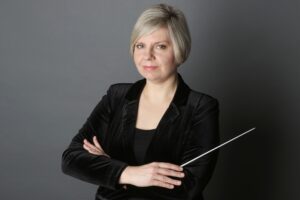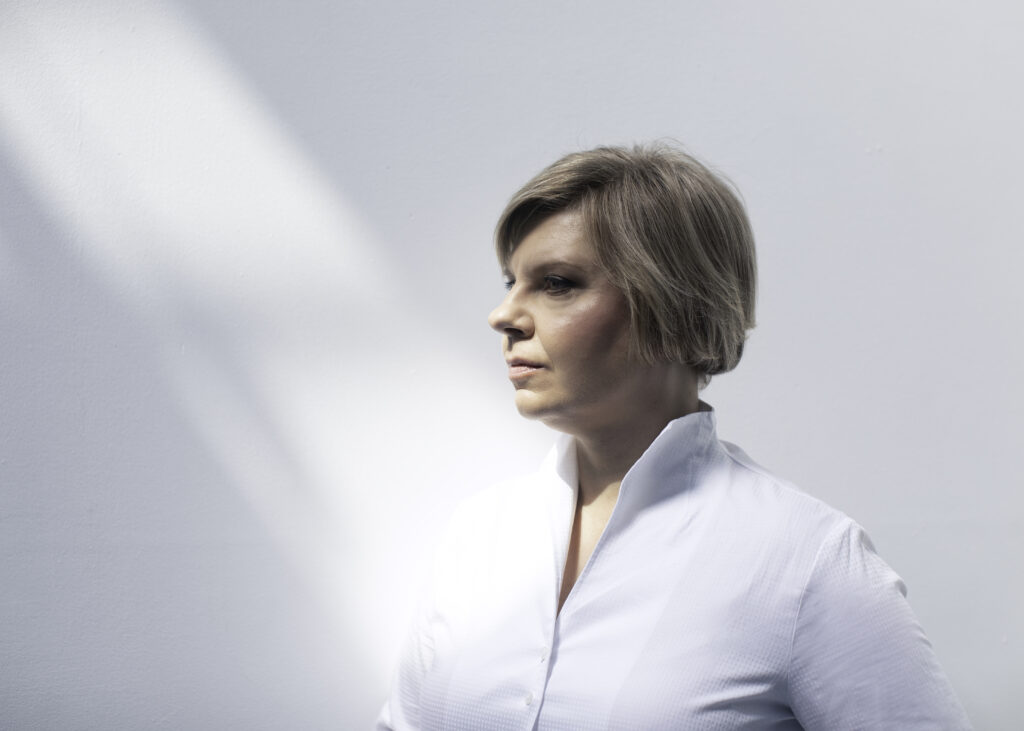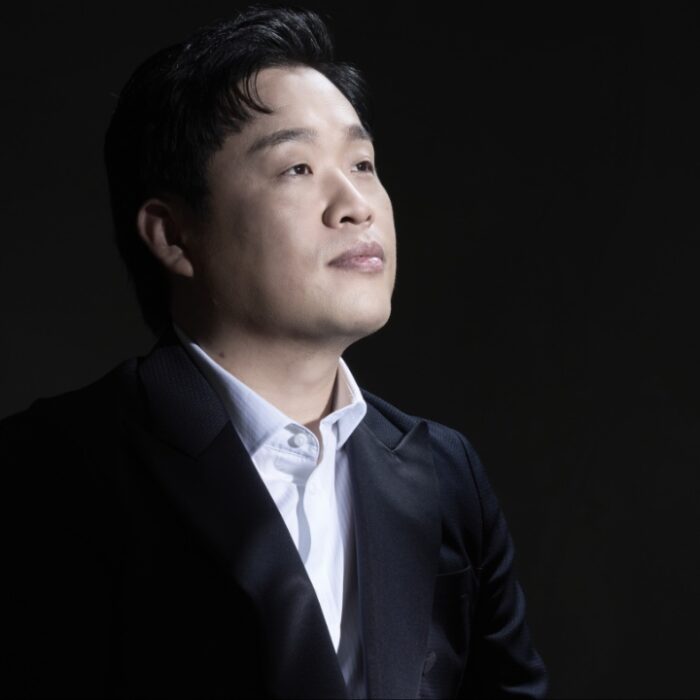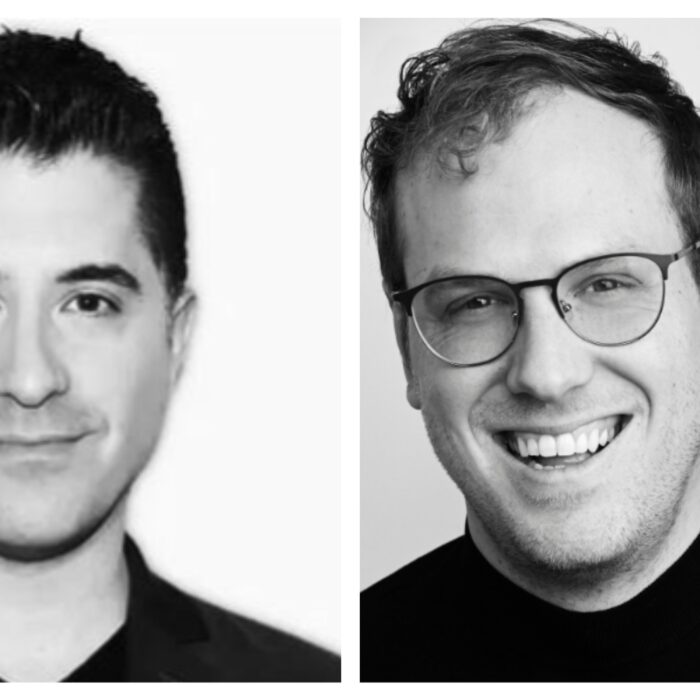
Q & A: Conductor, Pianist, and Vocal Coach Lada Valešová on Her Musical Journey
Capturing Lada Valešová through the Lens of Frances Marshall and Her Own Words
By Chris RuelPhotos credit: Frances Marshall/Marshall Light Studio
Lada Valešová, with her multifaceted role as a conductor, pianist, and coach, has a particular love for Janáček and Tchaikovsky. At 12 years old, an essential audition nudged Valešová towards a musical journey. Years later, she was working on operas such as “Cunning Little Vixen” and “Eugene Onegin.” Valešová has been recognized with a 2023 Off West End Award in Opera Ensemble for bringing Janáček’s opera, “Cunning Little Vixen,” to life with the Hampstead Garden Opera. Valešová is one of seven conductors on the prestigious Royal Philharmonic Society program “Woman Conductors Gateshead 2022-23” in partnership with Sage Gateshead and Royal Northern Sinfonia, which gives participants a unique opportunity to spend dedicated time conducting the orchestra in a series of residencies. She is a mentee of the Royal Opera House, RPS, and NOS programs for Women Conductors, one of only twelve conductors accepted into the first training course for woman conductors at the National Opera Studio, hosted by the Royal Philharmonic Society and the Royal Opera House.
Tchaikovsky and Janáček have persistently touched her soul, forming deep emotional connections that have filtered into her career. Her professional joy manifests in several dimensions: experiencing unity with vocalists, savoring the serene silence at the conclusion of a work, and witnessing the evolution and success of her students. Valešová promotes a cooperative approach in her musical endeavors, guiding musicians to excel and blossom under her direction.
Some of Valešová’s noteworthy engagements include being an Assistant Conductor to Oksana Lyniv on the production of “Tosca” at the Royal Opera House, working alongside Stuart Stratford at the Scottish Opera on the instrumental version of Janáček’s “Diary of One Who Disappeared” produced for the Lammermuir Festival, and assisting Sian Edwards on Tchaikovsky’s “Iolanta” for Opera Holland Park.
OperaWire connected with Valešová to discuss her journey and style as a conductor, pianist, and vocal coach.
OperaWire: What solidified your decision to pursue a career in music, and how did that experience shape your journey?
Lada Valešová: It was meeting the right teacher at the right time and realizing that I wanted to do music. It was she who ignited the passion.
I’ve always been very musical — I’ve played, sung, danced (a little) — but it was clear that playing piano was my strong side. I practiced and studied, and then, at age 12, I had to choose what I wanted to do with the rest of my life. My parents said I should try for a conservatory.
They found a teacher who came from what was the Soviet Union and taught in Prague. She first saw me for a consultation and was positive. She then arranged for me to audition a little program for one of her students. She didn’t tell me that the student had been judging competitions from a very early age and was training to become a world-class pianist. So, very naïvely, I went and played and thought I did well. The girl took a seat at the piano and played Chopin etudes and Beethoven sonatas. At that point, it was either give up or dig in, and that’s what happened.

©FrancesMarshall
OW: What were some of your earliest and most memorable experiences with music and theater?
LV: It was a “Eugene Onegin” performance when I was seven or eight. I was totally overwhelmed by it. There was also the ballet and “Swan Lake.” These were my first theater experiences.
Concert-wise, I would say I was very happy to see a lot of exceptional recitals while at conservatory, but the first impact was the theater. At “Onegin,” I remember being impressed by the smoke to show the cold and wondered how they did that. Then, there was the melancholy of Lensky’s aria; I still remember it. It was a beautiful environment, and I was mesmerized.
OW: Can you share your initial encounters with the works of Tchaikovsky and Janáček as a child and how their compositions managed to establish an emotional connection with you?
LV: I started with Tchaikovsky’s children’s album as a child. You could sense the beauty and accessible form in the music. I still remember the names of all the pieces on that album.
I think Tchaikovsky deeply grasped a child’s world, given how he composed his pieces, which immediately establishes an emotional connection.
I share a similar story with Janáček, albeit through a different avenue. The emotional connection is immediate in his case.
OW: How do your coaching and conductor roles complement each other, and how does your personal life influence or intersect with your professional journey in music?
LV: The coaching and conducting go well together. You can shape and work with the musicians in preparation- the old-fashioned way appeals to me. If the singer is open to dialog, we shape things together at the piano.
I guess it’s like when anybody does various things. There’s one [pursuit] at the forefront, and others behind that feed it. Right now, conducting is at the front.
I’m very lucky to have a supportive partner who says, “I know what I signed up for.” He supports me in what I want to do. And, because he’s not a musician, he provides perspective, which is very important, reminding me that I’m not working at a hospital where you have life-or-death situations.
OW: Can you describe the distinct joys you experience in your varied roles as a pianist, conductor, and coach?
LV: In my role as a pianist, I’ve been primarily involved in recent recitals with singers, an experience that’s deeply visceral. The joy emerges when I establish that perfect connection with the vocalist, resulting in a profound sense of unity.
As a conductor, it’s when I sense the show’s seamless flow, culminating in the holding of the final chord. There’s something extraordinary about the ensuing silence—a timeless and remarkable moment.
Regarding coaching, I find joy on two fronts: the human aspect and the psychological aspect. It’s heartwarming to receive a message from a student I taught two decades ago, saying, “Oh, you’re in town! Let’s have lunch.” Witnessing my former students evolving and thriving is incredibly gratifying. Some may choose different paths but return, reminiscing about our past lessons.
Exploring the psychological dimension of coaching is profoundly captivating. It involves discovering the key that unlocks each individual’s true self in that particular moment—a truly intriguing aspect of my journey.
OW: Tell me about the feelings you had during your initial experiences of making music with an orchestra.
LV: It wasn’t exactly an out-of-body experience, but it was certainly a significant moment, unlike anything I had experienced before. Musicians were playing, looking at me. The joy of co-creating carries a big responsibility, one that helps musicians perform at their best. Serving others is the key to leadership.
OW: What advice would you provide those in the industry who want to move into conducting?
LV: I would say, lose your ego. Ask how you can help while you’re learning. Say, “I’m here.” Can I sit in the corner of the pit and watch? Do some research on the people you want to approach.
OW: What is your philosophy or approach when coaching a new student?
LV: I prefer to listen—especially to their words. I don’t rely solely on my ears; I also observe closely. This approach can make them nervous. So, I often lighten the mood with humor to ease tensions, allowing us to begin our work. I realized that talking too much is not helpful. I listen to their sound. I listen to what they bring. It’s the same with orchestras. Instead of imposing, I want to hear what they have to offer.



